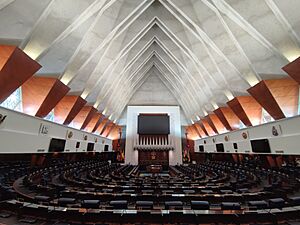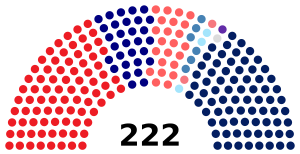Dewan Rakyat facts for kids
Quick facts for kids House of RepresentativesDewan Rakyat ديوان رعيت |
|
|---|---|
| 15th Parliament | |
 |
|
| Type | |
| Type | |
| Leadership | |
|
Speaker
|
Johari Abdul, PH-PKR
Since 19 December 2022 |
|
Deputy Speaker I
|
Ramli Mohd Nor, BN-UMNO
Since 19 December 2022 |
|
Deputy Speaker II
|
Alice Lau, PH-DAP
Since 19 December 2022 |
|
Secretary
|
Nizam Mydin Bacha Mydin
Since 13 May 2020 |
|
Deputy Prime Minister I
|
Ahmad Zahid Hamidi, BN-UMNO
Since 3 December 2022 |
|
Deputy Prime Minister II
|
Fadillah Yusof, GPS-PBB
Since 3 December 2022 |
| Structure | |
| Seats | 222 |
 |
|
|
Political groups
|
Government (153)
PH (81)
BN (30)
GPS (23)
GRS (6)
WARISAN (3) KDM (2) PBM (1) Independent (7) Opposition (69) PN (68)
|
| Committees |
5
Committee of Selection
Public Accounts Committee House Committee Committee of Privileges Standing Orders Committee |
|
Length of term
|
Up to 5 years |
| Elections | |
| First-past-the-post | |
|
Last election
|
19 November 2022 |
|
Next election
|
By 17 February 2028 |
| Meeting place | |
 |
|
| Dewan Rakyat chamber Malaysian Houses of Parliament, Kuala Lumpur, Malaysia |
|
The Dewan Rakyat is like the "House of Representatives" or "People's Assembly" in Malaysia. It's the lower part of Malaysia's main law-making body, called the Parliament. The Parliament has two parts: the Dewan Rakyat and the Dewan Negara, which is the upper house.
The Dewan Rakyat is made up of 222 members. These members are called Members of Parliament (MPs). People vote directly for them in elections. Each MP represents a specific area, called a federal constituency. They keep their seats for up to five years. After five years, a new election must be held.
Even though both parts of Parliament need to agree on new laws, the Dewan Rakyat has more power. It can usually pass laws even if the Dewan Negara doesn't agree right away. The government's main team, called the Cabinet, is also mainly responsible to the Dewan Rakyat. The Prime Minister needs the support of the Dewan Rakyat to stay in power.
Contents
How the Dewan Rakyat Started
The idea for the Dewan Rakyat began a long time ago with something called the Federal Legislative Council. In that council, 52 out of 100 members were chosen directly by the people. This was similar to how MPs are chosen today.
In 1959, the old council was closed down. This made way for the first Dewan Rakyat, which became the lower house of Malaysia's Parliament. The way people voted stayed the same. The number of seats grew to 104, and all members were elected by the people. The ruling group, called the Alliance, won most of the seats. Tunku Abdul Rahman became the Prime Minister again. The new Parliament met for the first time on September 2, 1959.
After Malaysia was formed, some areas like Sabah, Sarawak, and Singapore had a special arrangement. Their representatives were chosen by their local assemblies, not directly by the people. So, in the 1964 elections, not all seats were directly voted on. The Alliance group continued to win many seats.
The 1969 elections were different. The Alliance group did not win as many votes as before. This led to some unrest, and Parliament was paused until 1971. When Parliament reopened, the Alliance group, now called Barisan Nasional, gained more support and formed a strong government again.
Who Are the Members?
Members of the Dewan Rakyat are called "Members of Parliament" or "Ahli Dewan Rakyat" in Malay. They hold their positions as long as they win in the elections.
To be an MP, a person must be at least 18 years old. This age limit was changed from 21 in 2019. An MP cannot also be a member of the Dewan Negara at the same time.
The person in charge of the Dewan Rakyat is called the Speaker. MPs choose the Speaker when a new Parliament starts or if the Speaker's position becomes empty. There are also two Deputy Speakers who help the Speaker. If the Speaker is not there, one of the Deputy Speakers takes their place.
A special officer called the Clerk of the House helps run the Dewan Rakyat. The King appoints this person.
As of the 2018 general election, there are 222 elected members in the Dewan Rakyat. These members are elected from different areas called federal constituencies. The borders of these areas are redrawn every ten years based on how many people live there.
Each Dewan Rakyat lasts for a maximum of five years. After this, a general election must be held. In a general election, people vote for a candidate to represent their area. The candidate who gets the most votes wins the seat. This is called the first-past-the-post voting system.
Before a general election can happen, the King must officially close Parliament. The Prime Minister usually suggests this to the King. The King has the power to agree or disagree with closing Parliament.
How Laws Are Made
The Parliament is the part of the government that makes laws for the country. These laws are called Acts of Parliament.
MPs have special rights when they speak in Parliament. They can talk about any topic without being punished outside Parliament. This protection applies when they are speaking inside the House. However, there are some limits. For example, a law passed after the 1969 events makes it illegal to discuss changing certain parts of the Constitution. This includes rules about special rights for certain groups of people. MPs are also not allowed to criticize the King or judges.
The government's leaders, including the Prime Minister and the Cabinet, are usually chosen from the MPs. Most of them are from the Dewan Rakyat. After an election, the King chooses the Prime Minister. The Prime Minister is the head of the government. Usually, this is the leader of the party with the most seats in Parliament.
The Prime Minister then gives the King a list of people to be Ministers in the Cabinet. These Ministers must also be MPs. The Cabinet decides on government plans and writes new laws. All Cabinet members must agree with the decisions made, even if they privately disagree. If they don't want to be responsible for a decision, they must resign. There is also a Deputy Prime Minister who steps in if the Prime Minister cannot do their job.
A new law starts as a draft, called a bill. A government minister or department prepares this draft. The Cabinet then discusses the bill. If they agree, the bill is given to all MPs.
The bill then goes through three steps in the Dewan Rakyat:
- First reading: The minister officially presents the bill to Parliament.
- Second reading: MPs discuss and debate the bill.
- Third reading: The minister formally asks for a vote to approve the bill.
Most bills need a simple majority of votes to pass. But for big changes, like to the Constitution, a two-thirds majority is needed. If the bill passes in the Dewan Rakyat, it goes to the Dewan Negara (the upper house). It goes through the same three steps there. The Dewan Negara can delay a bill, but usually, it passes within a month or a year.
If the bill passes both houses, it goes to the King. The King has 30 days to look at the bill. If the King doesn't agree, he can send it back with suggestions for changes. Parliament must then look at the bill and the suggestions again. If they pass it again, they send it back to the King. The King then has another 30 days to approve it. If the King doesn't approve it within that time, the bill still becomes a law. The law only officially starts after it is published in the Government Gazette.
Sometimes, the government keeps new bills very secret. MPs might only get copies a few days before they are discussed. In some rare cases, a bill might be discussed and voted on all in the same day.
It is also possible for individual MPs, not just the government, to suggest new laws. These are called "private member's bills." However, this doesn't happen very often in Malaysia. To suggest a private member's bill, an MP needs permission from the House to discuss it.
Special Chamber for Discussions
In 2016, the Speaker of the Dewan Rakyat, Pandikar Amin Mulia, started a "Special Chamber." This is a separate meeting place where important national issues can be discussed without stopping the main Parliament meetings. Both government and opposition leaders liked this idea.
The Special Chamber was created to discuss "any matter of administration for which the government is responsible" or "an urgent public matter."
Liew Chin Tong, who was an opposition MP at the time, said he suggested the Special Chamber. He wanted it to be like similar chambers in Australia and Britain. He also suggested that the Special Chamber should handle local issues so the main chamber can focus on the most important things. He also thought the Special Chamber should have more time for debates.
In 2023, the new Speaker, Johari Abdul, announced that the Special Chamber would discuss twice as many topics per session. He also said that MPs from both the opposition and government could lead the Special Chamber meetings, not just the Speaker and Deputy Speakers.
Current Members
 |
|||||
| Affiliation | Leader in Parliament | Status | Seats | ||
|---|---|---|---|---|---|
| 2022 election | Current | ||||
| Pakatan Harapan | Anwar Ibrahim | Majority coalition government | 81 | 81 | |
| Barisan Nasional | Ahmad Zahid Hamidi | 30 | 30 | ||
| Gabungan Parti Sarawak | Fadillah Yusof | 23 | 23 | ||
| Gabungan Rakyat Sabah | Jeffrey Kitingan | 6 | 6 | ||
| Heritage Party | Shafie Apdal | 3 | 3 | ||
| Social Democratic Harmony Party | Wetrom Bahanda | 2 | 2 | ||
| Parti Bangsa Malaysia | Larry Sng | 1 | 1 | ||
| Independent | Verdon Bahanda, Iskandar Dzulkarnain Abdul Khalid, Suhaili Abdul Rahman, Mohd Azizi Abu Naim, Zahari Kechik, Syed Abu Hussin Hafiz and Zulkafperi Hanapi | 1 | 7 | ||
| Perikatan Nasional | Muhyiddin Yassin | Opposition | 74 | 68 | |
| Malaysian United Democratic Alliance | Syed Saddiq Syed Abdul Rahman | 1 | 1 | ||
| Total | 222 | 222 | |||
Members by State and Territory
The number of Members of Parliament (MPs) from each state and federal territory in Malaysia is based on their population. This table shows how many seats each area has in the Dewan Rakyat:
| State / federal territory |
Number of seats | Population (2020 census) |
Population per seat |
|---|---|---|---|
| 11 | 1,982,112 | 180,192 | |
| 1 | 95,120 | 95,120 | |
| 1 | 109,202 | 109,202 | |
| 26 | 4,009,670 | 154,218 | |
| 15 | 2,131,427 | 142,095 | |
| 14 | 1,792,501 | 128,036 | |
| 6 | 998,428 | 166,405 | |
| 8 | 1,199,974 | 149,997 | |
| 14 | 1,591,295 | 113,664 | |
| 13 | 1,740,405 | 133,877 | |
| 24 | 2,496,041 | 104,002 | |
| 3 | 284,885 | 94,962 | |
| 25 | 3,418,785 | 136,751 | |
| 31 | 2,453,677 | 79,151 | |
| 22 | 6,994,423 | 317,928 | |
| 8 | 1,149,440 | 143,680 |
See also
 In Spanish: Dewan Rakyat para niños
In Spanish: Dewan Rakyat para niños

